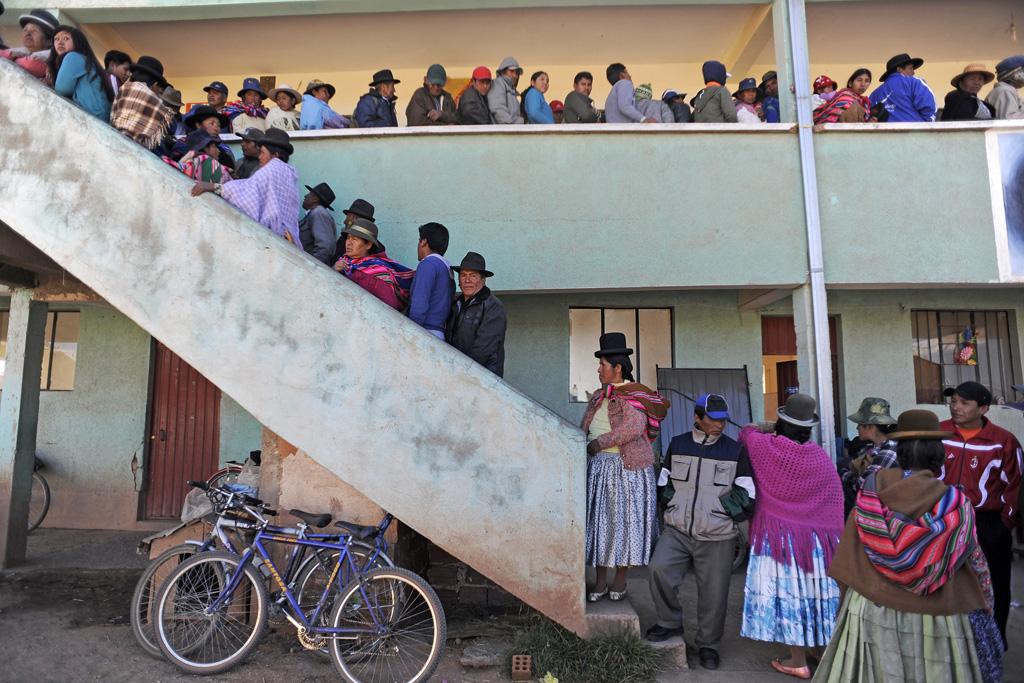Bolivia votes in presidential poll; Morales seen cruising to win
Citizens line up to vote at a polling station in the village of Laja, west of La Paz, in the highland Andean plateau, Oct. 12, 2014.
LA PAZ, Bolivia — Bolivians voted Sunday in an election that is almost certain to hand a third consecutive term to President Evo Morales, a former coca farmer who promises to consolidate leftist reforms that have expanded the role of the state in a booming economy.
Voters lined up early outside a polling station set up in the San Jines college in central La Paz where police patrolled the streets in large numbers. Voting began relatively promptly at 8 a.m., though longer delays were reported in rural areas.
Morales' folksy appeal and prudent spending of funds from a natural gas bonanza to finance welfare grants, roads and schools have won the 54-year-old wide support in a country long dogged by coups and political instability.
"I voted for Morales," said Flavia Nunez, a 50-year-old office clerk. "These other right-wing candidates would take us back in time. I don't want that."
Morales, the Andean nation's first ethnic Aymara leader, voted in a steamy jungle region where he grew coca as a young man. He urged all Bolivia's roughly 6 million registered voters to cast their ballots "to show the country's unity."
His campaign billboards ran the slogan "With Evo we're doing well." Opinion polls ahead of the vote showed Morales, who never finished high school, thrashing rivals to win outright in the first round with 60 percent of the vote.
If he wins, Morales, who rails against capitalism but has won plaudits from Wall Street for running a fiscal surplus, is set become Bolivia's longest serving president.
He has delivered eight years of economic growth averaging above 5 percent since he assumed office in 2006, nationalizing key industries including oil and gas and using the windfall to finance his brand of "indigenous socialism."
The number of Bolivians living in extreme poverty has fallen to one in five from more than a third of the 10 million population in 2006.
Corruption and cocaine
Morales' rivals accuse him of using his power to control the courts and of violating the constitution which limits a president to two consecutive terms.
Last year, the Supreme Court decreed his 2006-2009 period in office should not be counted as a first term as it preceded the adoption of the new constitution. Opponents blasted the decision.
His main rivals are Samuel Doria Medina, a cement tycoon easily beaten by Morales in the last two elections, and Jorge Quiroga, a conservative who was president between 2001-2002.
Doria Medina has promised to clean up a judiciary he says is corrupt while Quiroga has pledged to tackle organized crime in the world's third largest producer of cocaine.
"It's time for change. This government has had two terms and I don't like it when a small clique lingers on in power," said economist Miguel Angel Perez, 53, who voted for Quiroga.
To avoid a second-round runoff, Morales needs to win 50 percent of valid votes, or 40 percent with a lead of at least 10 percentage points over his nearest rival.
Voters are also electing lawmakers. Morales' Movement Toward Socialism party is expected to keep its grip on Congress.
Voting ends at 4 p.m. (1600 ET) and preliminary results based on 70 percent of the vote are expected later on Sunday.
(Additional reporting by David Mercado and Monica Macchicao; Writing by Richard Lough; Editing by Jon Boyle)
Every day, reporters and producers at The World are hard at work bringing you human-centered news from across the globe. But we can’t do it without you. We need your support to ensure we can continue this work for another year.
Make a gift today, and you’ll help us unlock a matching gift of $67,000!
